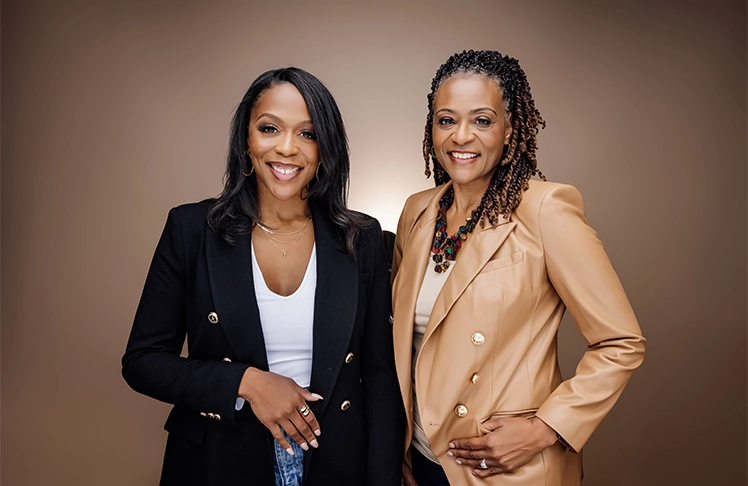
By Aaron Allen, The Seattle Medium
In March 2023, Seattle natives Mary Wideman-Williams and her daughter, Marquinta Obomanu, launched SistahBoss—a leadership initiative designed to support and elevate Black women across personal and professional spaces. More than a program, it’s a response to the lack of spaces where Black women can lead confidently, build meaningful connections, and grow within a supportive community.
Wideman-Williams, a longtime city leader, saw firsthand the absence of Black women in leadership development spaces. Obomanu, whose background includes youth development and nonprofit work, shares that vision and brings a passion for cultivating leadership in others. Together, they set out to build a new model of leadership development that is grounded in representation, resilience and community.
Through coaching, workshops, and events, SistahBoss builds leadership capacity while also fostering belonging. Its core offerings include mentorship, resource sharing, and networking opportunities designed for Black women in careers, business, and nonprofit spaces. The organization also advocates for equitable policies that support women-owned businesses and long-term career advancement.
According to Wideman-Williams, the idea for SistahBoss came from years of being one of the few Black women in professional leadership environments.
“One thing that occurred to me is that I’m always in these spaces teaching people about leadership, and I didn’t see very many Black people in my classes or in my workshops and particularly Black women,” said Wideman-Williams. “So that was an ah-ha moment for me.”
As she approached retirement, Wideman-Williams began to reflect more deeply on what had been missing in her own journey.
“I realized that I had mentors and people who poured into me individually, but what I really needed was a community of other Black women leaders to connect with and be supported by, especially when it came to leadership development,” said Wideman-Williams.
That reflection led to a mission to build the kind of support she once needed.
“What a blessing to be able to be in a learning environment with other people that look just like me and Black women in particular,” said Wideman-Williams. “So, the ‘why’ really was trying to create something that I wish I had as a Black woman in leadership.”
For Obomanu, the mission was equally personal and deeply rooted in community engagement.
“I have a heart for working within the community and our young people and also developing leaders among Black women and Black young women, and I’m excited about the work we’re doing with SistahBoss,” said Obomanu, a graduate of Tennessee State University and proud HBCU alum. “We started in 2022, and this has been a long-time conversation and passion for the both of us. To create some space for Black women leaders to reflect, connect, and create community. Little bit of a support hub.”
The work extends beyond professional development. SistahBoss actively works to counter the isolation Black women often experience in predominantly white workplaces. Its events and programs offer both practical tools and emotional support.
“Being a Black woman in a leadership position can be very isolating and particularly here in the Pacific Northwest, there hasn’t been groups or communities that really spoke to that need,” said Wideman-Williams. “There are sororities and other women’s groups and church groups and all of that. And I think those groups serve their purpose really well, but this was a niche that we didn’t feel was really as strongly represented as it could be, and it was an opportunity for us to lean into that and to give back to that.”
Obomanu spoke about the importance of creating a sense of belonging through SistahBoss.
“We say all the time in our programming that something magical happens when Black women are in the room,” said Obomanu. “This kind of programming and this network is really important, specifically here in the Pacific Northwest. Because there are so many women who are from the area or new to the area because of work and because Seattle’s Black community has now been misplaced and there’s not one specific hub or neighborhood where you can just go to and get those automatic connections.”
In addition to practical support, the program emphasizes shared identity, lived experience, and the cultural significance of Black women in leadership roles. SistahBoss centers its approach on four leadership strengths Black women bring:
• Diverse perspectives that lead to stronger, more inclusive decision-making
• Visibility and inspiration that serve as powerful models for the next generation
• Commitment to equity, often addressing structural and systemic issues head-on
• Economic impact through entrepreneurship and inclusive business practices
Both women agree that the emotional and mental toll of being the “only one in the room” is something SistahBoss intentionally helps to address. It’s not just about advancing careers—it’s about building up leaders holistically.
“It’s really important that when Black women are the only person at the table in their workspaces, the microaggressions that we face, the doubters that we face, all those different things that we encounter in the workplace, we can be fueled if we have other women who look like us, speak our language and create a safe space and safe community to learn from one another, to help build each other up and affirm one another and who we are as Black women and as Black leaders,” said Obomanu.
Wideman-Williams said it’s the shared presence and emotional connection that make SistahBoss truly powerful.
“To have your experiences validated, your presence welcomed, and your growth encouraged—it’s something I always wanted and now we get to offer that to others,” said Wideman-Williams.
The organization also stresses the importance of unity. SistahBoss teaches that collaboration among Black women builds collective strength, enables effective advocacy, fosters resource sharing, and ensures cultural identity is preserved and celebrated.
The women are also intentional about lifting as they climb. Sharing success stories and peer mentorship are embedded into the structure of every event and workshop.
Obomanu reflected on the energy and resilience of Black women leaders, noting they are often unmatched—and too often under-supported.
“When we build each other up, we are unstoppable,” said Obomanu. “But we need places to go that understand what we’re up against and what we bring to the table.”
As SistahBoss continues to grow, its founders remain focused on building a space that not only develops individual leaders but strengthens the broader community through collective empowerment. By creating a network grounded in authenticity, affirmation, and action, Wideman-Williams and Obomanu are ensuring that more Black women are seen, heard, supported—and leading.



